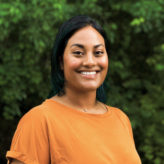Nothing tests a new marriage quite like spending roughly 90-95% of your time together. Add in a historic breakdown of our democracy and the highest unemployment rates since 1948, and it becomes easy to see how the pandemic caused a spike in global divorce and breakup rates.
While we’ve had our fair share of stress — including battling COVID together — and marital conflict, my relationship with my husband has actually grown stronger during this time.
My working theory behind why is simple: since we have no place to hide we must be radically transparent with one another and hope we’ll be accepted.
If you’re like me and grew up in a strict household, you’ll recognize just how hard radical transparency can be in practice. To let down your guards, making yourself vulnerable to harm?
No, thank you. I’d rather chew glass.
Still, we somehow found ourselves breaking down our walls and revisiting old conversation points.
Of these conversations, one topic in particular loomed above me like a dark cloud. Ever since getting married, I’ve felt a distinct loss of ownership or agency over the way my sexuality is publicly perceived. I actively mourn that loss and struggle with ways to express this to him.
I’m not concerned that he won’t accept my sexuality. My queerness has never been a secret in our relationship — in fact, my official “coming out” post on Facebook came nearly a year after us dating (thanks in large part to his support and acceptance of who I am):
However, his support doesn’t make me feel any less like an imposter, and I constantly struggle with feeling like I’m not “allowed” to call myself bisexual while in a monogamous relationship with a person of the opposite gender (especially when both of us are cisgender).
These fears are not unfounded.
There is an added pressure on the 31% of US adults who identify as bisexual from both the straight and queer communities to “pick a side” or “make a choice.” Although bisexual representation in the media has grown over the years, there is a long history of showcasing us in a negative light and perpetuating these assumptions.
Whether it’s in the form of the friend who can’t seem to stay faithful when faced with men and women, or the woman who has one “eye-opening” experience with the token college lesbian before settling into hetero-suburban bliss, these portrayals push a frustrating narrative:
True bisexuality does not exist, and we’re all either actually a) straight and looking for attention, or b) gay with a healthy dose of internalized homophobia.
How, then, can I feel proud during Pride?
Am I allowed to claim my queerness during this time, and how does my privilege intersect with the rest of the LGBTQ+ community?
Is there room enough for us all to be safe, accepted, and loved?
To be honest, I don’t know that I have an answer to any of these questions but the last one.
I can’t control how my sexuality is perceived by anyone, or how my queerness impacts others. For some, my bisexuality will be valid regardless of who I’m with; for others, no explanation will ever be enough to convince them that I am, in fact, queer.
All I can do is build a space filled with the understanding, love, and acceptance that I want and invite others into it. By being my most authentic self, perhaps I can inspire others to do the same.
So here it is, laid out for all to see:
I am a bisexual woman married to my best friend, a man. I am both emotionally and physically attracted to him. Outside of us, I mostly feel attraction to women. These facts exist in harmony — rather than in opposition to — one another. I accept that while I identify as bisexual, my sexuality is fluid and my preferences are subject to change over the course of my life, and I may sometimes feel that my labels don’t fit what I’m feeling. And that’s okay.
If you or someone you know struggles with defining your sexuality, or you’re simply unsure where or how you fit into the queer community, this is your official invitation join me — and the sex positive folks over at DC Beings — in reclaiming and celebrating your queer narrative this Pride season!
We’re here, we’re queer, and babe, that’s more than enough.



